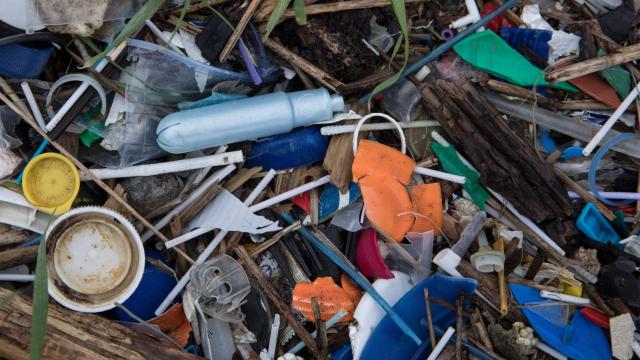New research suggests that infants are getting more microplastics in their system than everyone else. The study found that the poop of 1-year-old babies had higher levels of microplastics than did the poop of adults, while plastics could even be found in newborn poop. Though based on a small sample size, the findings could indicate younger children face a heightened risk of exposure to the hormone-disrupting chemicals that leach out from plastics.
Microplastics — any piece of plastic smaller than 5 millimetres — have gotten a lot of scientific attention in recent years. Studies have found plastics everywhere in our environment, from the ocean to the wind to archaeological sites, and these plastics are also ending up in our bodies.
Research into the health effects of plastic exposure is still ongoing, but the major source of danger likely comes from a large group of endocrine-disrupting chemicals, or EDCs, commonly found in plastic. These chemicals mimic the hormones in our body that help regulate crucial processes like sleep and fertility. Some studies have suggested EDCs can raise the risk of infertility, metabolic disorders like diabetes, and even certain cancers.
That makes the findings of this new study, published Wednesday in Environmental Science & Technology Letters, all the more concerning.
A team of researchers from the U.S. and China tested samples of poop from three newborns (for the newborns, it was their first ever faecal emission), six 1-year-old infants, and 10 adults, looking specifically for traces of two common plastics. They excluded another plastic, polypropylene, that could be found in diapers to reduce the risk of contaminated results.
All the adults and the infants had one or both types of plastic in their poop. But on average, the infants had levels of both plastics an order of magnitude higher than the average amount found in adult poop. Some of the newborns had plastic in their poop, too, indicating that their exposure had happened even before birth (other studies have found plastics in the placenta).
The research is described as a pilot study — an early attempt to see whether further studies are needed to explore a specific topic deeper. So the results shouldn’t be seen as conclusive. And at this point, there remain many questions about the exact harm posed by microplastics and the chemicals they contain.
“Unfortunately, with the modern lifestyle, babies are exposed to so many different things for which we don’t know what kind of effect they can have later in their life,” co-author Kurunthachalam Kannan, an environmental health scientist at New York University School of Medicine, told Wired.
Whatever the effects of EDCs turn out to be, scientists have feared that early exposure to them may be even worse, since hormones play an important role in our development, including puberty. And if these results are validated through future studies, they point to a worrying concern for younger children in particular. While the obvious route of exposure may be the toys or milk bottles children put in their mouths, there might yet be other hazards unique to them.
“This is a very interesting paper with some very worrying numbers,” Deonie Allen, a microplastic researcher at the University of Strathclyde not involved in the study, told Wired. “We need to look at everything a child is exposed to, not just their bottles and toys.”
Because plastics are so ubiquitous, there’s likely not much any individual person can do to reduce their risk of exposure. But scientists are starting to call for widespread systemic action to be taken in reducing the use of plastic across different industries. Last year, a major report from the Endocrine Society and others declared plastics to be a global health threat, both to wildlife and humans.
